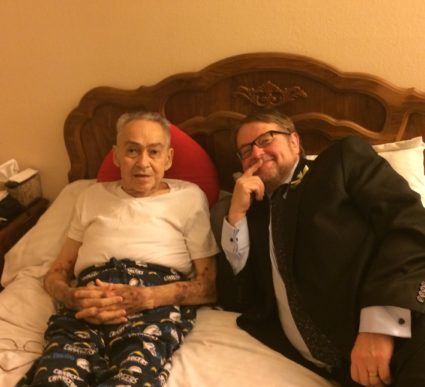
The song, released Wednesday, describes how “a city aflame fought fire and ice ’neath an occupier’s boots,” which Springsteen calls…

Our July pick for the PBS NewsHour-New York Times book club Now Read This is "The House of Broken Angels" by Luis Alberto Urrea. Become a member of the book club by joining our Facebook group, or by signing up to our newsletter. Learn more about the book club here.
At its heart, Luis Alberto Urrea's "The House of Broken Angels" is a personal book. Urrea got the idea for the novel, which centers around a blow-out birthday party for the character Big Angel, after his own family held a big birthday party for his eldest brother, Juan, as he was dying of cancer. (Juan is pictured above with Urrea). But while the novel is about death and loss and regret, it is also about joy and humor and laughter as a kind of salve.

"My family is hilarious. This fictional family is hilarious. If you came to my house today, you would find out our kids are hilarious," said Urrea. "There is a way to laugh that is cruel and there is a way to laugh that offers sanctuary."
Below, read more of what Urrea was thinking as he wrote, and about his personal connections to the text, in an annotated page from "The House of Broken Angels." (Click on the yellow highlights to see the annotations.)
Big Angel patted the bed. "Sit."
Apparently the ethnic civil war had passed like one of the tardy little rain clouds speeding east to collapse against the Cuyamaca Mountains.
"Carnal!" Big Angel said, eyes suddenly as bright as little black campfires. "Remember how my father peeled oranges?"
Little Angel nodded. "I remember our father, yeah."
Big Angel took the hint. "Our father. Put chile powder on oranges."
"And salt." "Tajín!"
They found this funny for some reason.
"He peeled oranges in one long strip," Big Angel shouted. "He made snakes out of the peel. Every time."
They laughed some more. It felt good to laugh. Mindless. Safe.
"He told me they were tapeworms," Little Angel said.
"Did I ever tell you about — " Big Angel blurted, and he was off on a binge of storytelling. Jokes and sorrows. Strange tales of their ancestors. Questions about Seattle. When he began a detailed tour of the many medicine bottles on his table, and doses and times of administering them, Little Angel gave up standing there awkwardly and climbed into bed beside his brother.
silence
good talk
oysters
a day without pain
Sustain our coverage of culture, arts and literature.